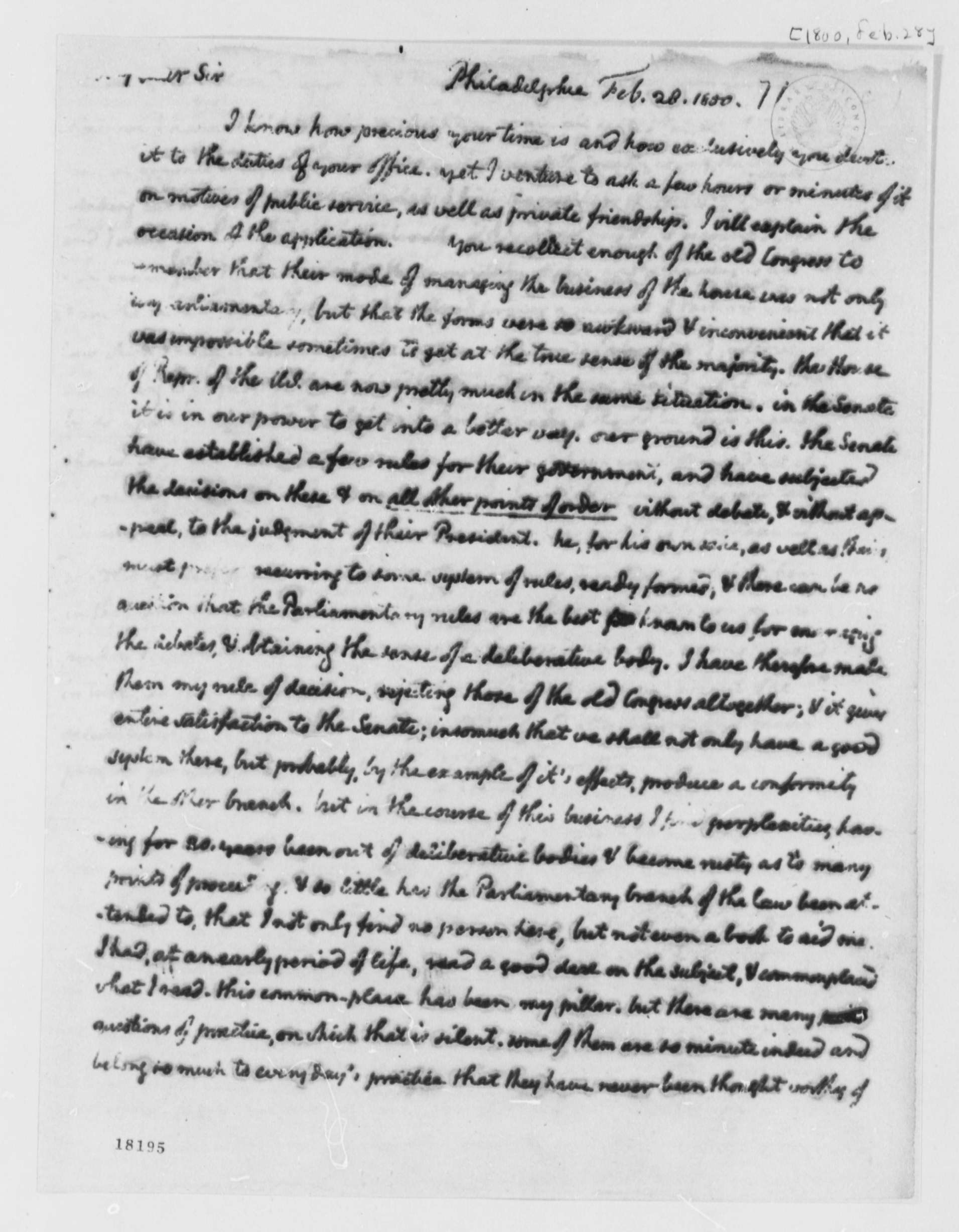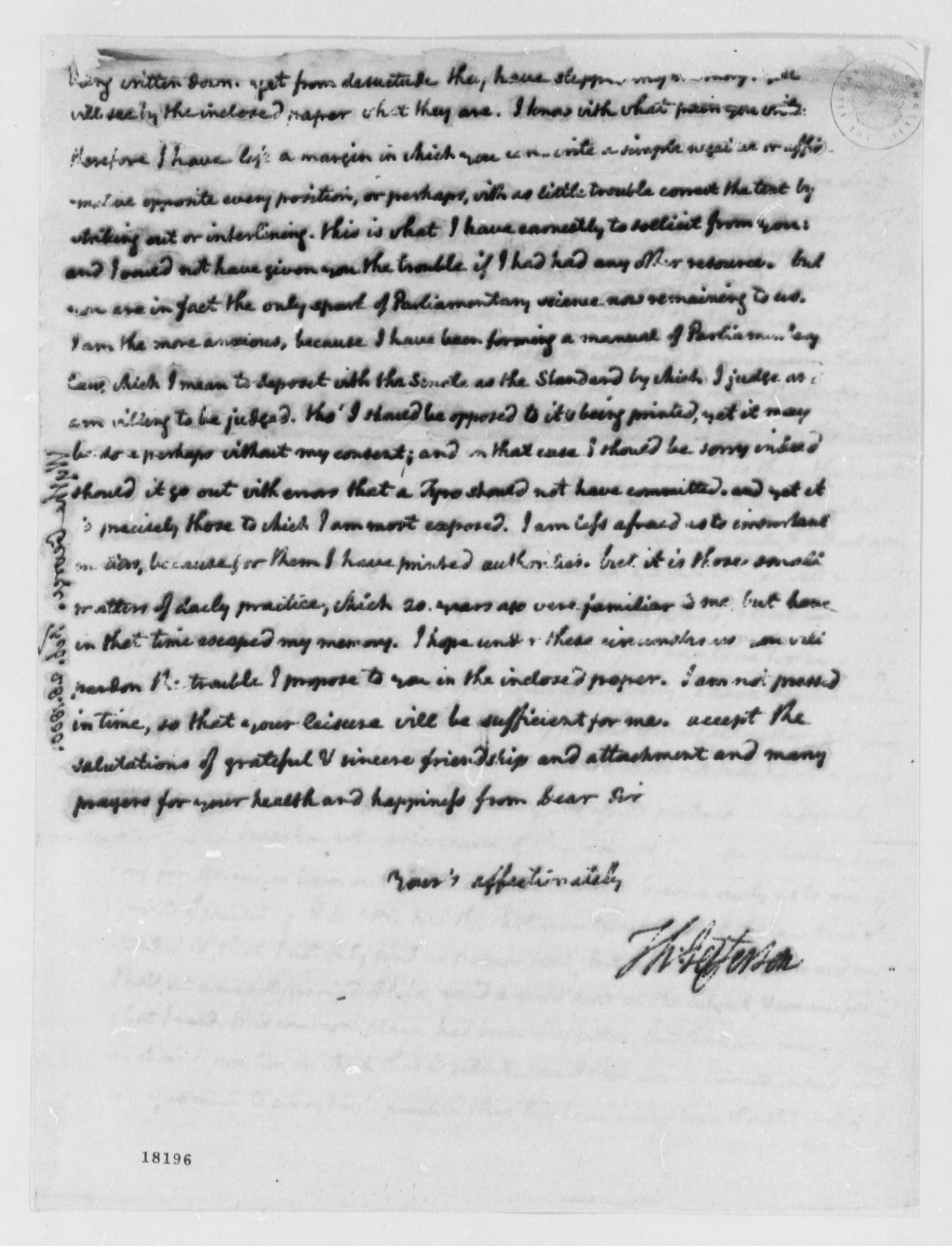Thomas Jefferson to Wythe, 28 February 1800
Thomas Jefferson, who had recently been elected president, discusses the situation of the House of Representatives with George Wythe. He talks about how the House operates inconveniently and awkwardly, much like how the House in the old Congress operated. The Senate on the other hand operates much smoother and whose success Jefferson believes has to do with to the Senate following Parliamentary rules. Jefferson knows that Wythe is suffering an ailment that makes it painful for him to write, so he tells Wythe to simply give a simple negative or affirmative to each position in the margin. Jefferson also gives him the option to strike through or underline sections of Jefferson's letter for the same reason instead of writing a response.

"Thomas Jefferson to Wythe, 28 February 1800, pg 1." Image from the Library of Congress, The Thomas Jefferson Papers.
Contents
[hide]Letter text
Page 1
My dear Sir, Philadelphia, Feb. 28. 1800.
I know how precious your time is and how exclusively you devote it to the duties of your office. yet I venture to ask a few hours or minutes of it on motives of public service, as well as private friendship. I will explain the occasion of the application. You recollect enough of the old Congress to remember that their mode of managing the business of the house was not only unparliamentary, but that the forms were so awkward & inconvenient that it was impossible sometimes to get at the true sense of the majority. the House of Repr. of the US. are now pretty much in the same situation. in the Senate it is in our power to get into a better way. our ground is this. the Senate have established a few rules for their government, and have subjected the decisions on these & on all other points of order without debate, & without appeal, to the judgment of their President. he, for his own use, as well as theirs must prefer recurring to some system of rules, ready formed, & there can be no question that the Parliamentary rules are the best known to us for managing the debates, & obtaining the sense of a deliberative body. I have therefore made them my rule of decision, rejecting those of the old Congress altogether; & it gives entire satisfaction to the Senate; insomuch that we shall not only have a good system there, but probably, by the example of it's effects, produce a conformity in the other branch. but in the course of this business I find perplexities, having for 20. years been out of deliberative bodies & become rusty as to many points of proceeding: & so little has the Parliamentary branch of the law been attended to, that I not only find no person here, but not even a book to aid me. I had, at an early period of life, read a good deal on the subject, & common-placed what I read. this common-place has been my pillar, but there are many questions of practice, on which that is silent. some of them are so minute indeed and belong so much to every day's practice that they have never been thought worthy of
Page 2

"Thomas Jefferson to Wythe, 28 February 1800, pg 2." Image from the Library of Congress, The Thomas Jefferson Papers.
being written down. yet from desuetude they have slipped my memory. you will see by the inclosed paper what they are. I know with what pain you write: therefore I have left a margin in which you can write a simple negative or affirmative opposite every position, or perhaps, with as little trouble correct the text by striking out or interlining. this is what I have earnestly to solicit from you: and I would not have given you the trouble if I had had any other resource. but you are in fact the only spark of Parliamentary science now remaining to us. I am the more anxious, because I have been forming a manual of Parliamentary law, which I mean to deposit with the Senate as the Standard by which I judge and am willing to be judged. tho' I should be opposed to it's being printed, yet it may be done perhaps without my consent; and in that case I should be sorry indeed should it go out with errors that a Tyro should not have committed. and yet it is precisely those to which I am most exposed. I am less afraid as to important matters, because for them I have printed authorities. but it is those small matters of daily practice, which 20. years ago were familiar to me, but have in that time escaped my memory. I hope under these circumstances you will pardon the trouble I propose to you in the inclosed paper. I am not pressed in time, so that your leisure will be sufficient for me. accept the salutations of grateful & sincere friendship and attachment and many prayers for your health and happiness from Dear Sir
Your's affectionately
Th: Jefferson